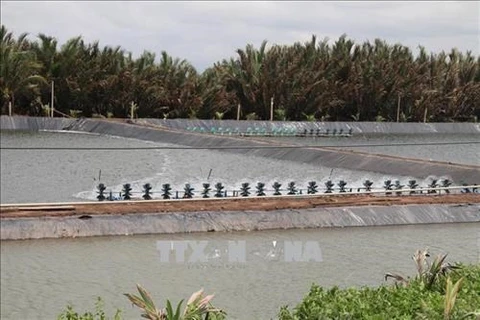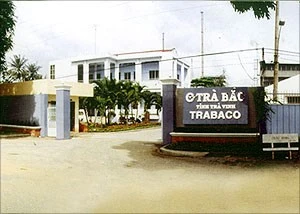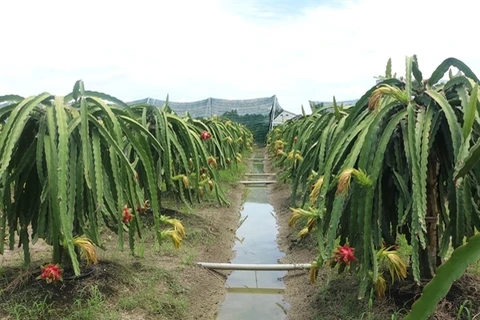 Local residents in Tu hamlet, My Long Nam commune, Cau Ngang district, Tra Vinh province sit together to seek ways for economic development. (Photo: Vietnam+)
Local residents in Tu hamlet, My Long Nam commune, Cau Ngang district, Tra Vinh province sit together to seek ways for economic development. (Photo: Vietnam+) Hanoi (VNA) - After each discussion session, local farmers both men and women can find a solution to their economic livelihood thanks to their direct contribution to that process.
“Siphon shrimp” remain a headache
Housewives in the city often prefer to choose shrimp that are moulting because their shells are soft and their meat still firm and delicious. Conversely, the moulting shrimp remains a headache for farmers as tonnes of the shrimp die daily because they can’t be sold in local markets and can’t be transported to markets outside of the locality. Moreover, growers have to hire workers to deal with the dead moulting shrimp, such as burying them to ensure environmental hygiene.
In recent years, high-tech shrimp farming applied in Mekong Delta provinces, including Tra Vinh, has proven effective. One high-tech solution is “siphoning”, which absorbs waste and excess food in the pond, releasing toxic gases out of pond and increasing dissolved oxygen in the water. But during this process, the moulting shrimp that are weak and cannot crawl are also sucked up, and are known by local farmers as “siphon shrimp”, Pham Van Sanh, Director of the Dong Tien Fisheries Cooperative in Tu hamlet, explained.
 Shrimp farmers have a “headache” from dealing with tonnes of moulting shrimp dying every day. (Photo: Vietnam+)
Shrimp farmers have a “headache” from dealing with tonnes of moulting shrimp dying every day. (Photo: Vietnam+) “Local farmers have a lot of headaches from dealing with Siphon shrimp,” said Sanh. “Every day, tonnes of these shrimp can’t be sold to traders because they are so weak. Oversupply makes their price fall to just 10,000 VND per kilo, but still they can’t be sold.”
This problem has concerned members of the Dong Tien cooperative and shrimp farmers in Tu hamlet for a long time, he explained.
Shrimp farmers are still to identify an effective method to take advantage of these shrimp. In fact, moulting shrimp can’t be dried because they are so soft. But if they are processed into food, like shrimp crackers or shrimp cakes, farmers would be required to invest in cold storage, factories, production techniques, and business knowledge, which are impossible for them.
Solving the problem thoroughly
After a long time of having no way to take advantage of dead “siphon shrimp”, local farmers came together to seek a solution. After thorough discussions, an initiative to use the dead shrimp as animal feed or organic fertiliser for crops was voted on by the majority of participants.
 Initiatives to use the dead shrimp as animal feed or organic fertiliser for crops was voted on by the majority of participants. (Photo: Vietnam+)
Initiatives to use the dead shrimp as animal feed or organic fertiliser for crops was voted on by the majority of participants. (Photo: Vietnam+) This result was due to a method funded by Gender Action Learning System, which promotes aquaculture and fisheries sustainability via the gender equality movement, said Le Van Son, Director of the Community Development and Family - Gender Research Centre.
The system operates on three principles. First, each person is a leader and each participant is reinforced with confidence and motivation to build their skills to express their personal view and participate in the decision-making process. Second, managers are encouraged to enhance their listening and communication skills to maximise the capacity and participation of members. And the third principle is equality for all. This means every member involved in the process, regardless of gender, age, status, economic condition, or other thing, has an equal opportunity to participate in decision-making and enjoy the same benefits.
The key point is that after each session, each member needs to have some concrete actions and commitments to take right away. Moreover, even small changes by each individual, family or group require that recognition and encouragement are maintained, learned, and replicated.
“This will help create momentum for more lasting and sustainable changes,” Son said./.






















